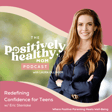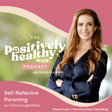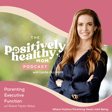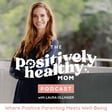
Know Their Hearts
Welcome to The Positively Healthy Mom Podcast! I'm Laura Ollinger and today I’m excited to share the latest episode of The Positively Healthy Mom podcast—this one’s a bit different. For the first time, it’s just me! No guest, no script—just an honest conversation straight from my heart to yours.
In this solo episode, I dive into a topic close to every parent's heart: Do you really know your child’s heart? I explore:
- The logistical grind that can prevent deeper connections with our kids
- How self-awareness and emotional regulation can help us become better listeners
- Six key reasons kids, especially teenagers, struggle to open up
- Why it’s crucial to teach resilience and help our children process pain without passing it on
Whether your child is struggling with mean comments from peers, wrestling with their identity, or simply navigating everyday challenges, this episode offers insights on how we, as parents, can become their emotional anchor—without rushing to fix things or judge.
I hope you’ll tune in, reflect, and feel inspired to create those meaningful, heart-centered moments with your child.
If this resonates with you, I'd love to hear your thoughts. And as always, thank you for being a part of this journey with me!














